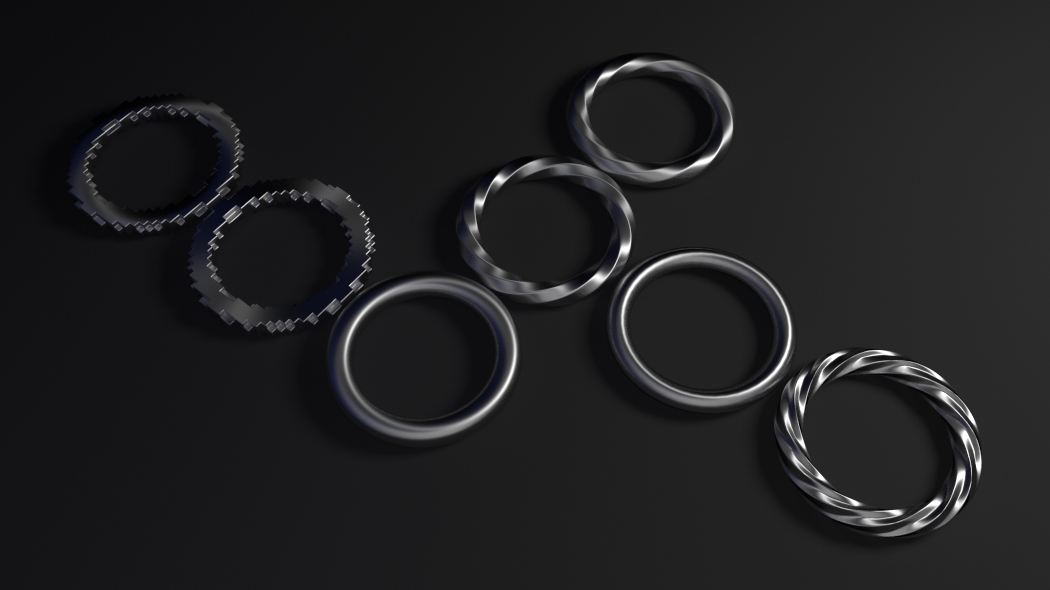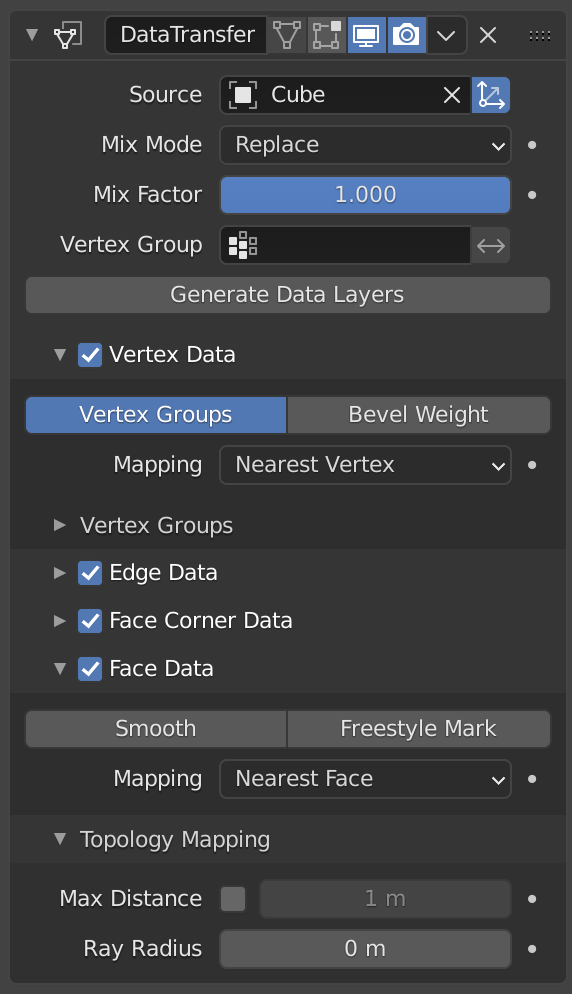Transferência de dados
The Data Transfer modifier transfers several types of data from one mesh to another. Data types include vertex groups, UV maps, vertex colors, custom normals…
Transfer works by generating a mapping between source mesh’s elements (vertices, edges, etc.) and destination ones, either on a one-to-one basis, or mapping several source elements to a single destination one, using interpolation.

Transferring normals between objects, see example blend-file.
Veja também
Opções

O Modificador de Transferência de dados.
- Fonte
O objeto de malha a partir do qual copiar os dados.
If the button to the right of the field is unset, both the source and the destination geometry is considered in global space when generating the mapping, otherwise they are evaluated in local space (i.e. as if both object’s origins were at the same place).
- Modo de mistura
Controls how destination data are affected:
- Todos
Replaces everything in destination (note that Mix Factor is still used).
- Acima do ajuste
Only replaces destination value if it’s above given threshold Mix Factor. How that threshold is interpreted depends on the data type, note that for Boolean values this option fakes a logical AND.
- Abaixo do ajuste
Only replaces destination value if it’s below given threshold Mix Factor. How that threshold is interpreted depends on the data type, note that for Boolean values this option fakes a logical OR.
- Mix, Add, Subtract, Multiply
Apply that operation, using mix factor to control how much of source or destination value to use. Only available for a few types (vertex groups, vertex colors).
- Mix Factor
How much of the transferred data gets mixed into existing one (not supported by all data types).
- Vertex Group
Allows per-element fine control of the mix factor. Vertex group influence can be reverted using the small «arrow» button to the right.
- Gerar camadas de dados
This modifier cannot generate needed data layers itself. Once the set of source data to transfer is selected, this button shall be used to generate matching destination layers, if needed.
Seleção dos dados para transferência
To keep the size of the modifier reasonable, the kind of elements to be affected must be selected first (vertices, edges, face corners and/or faces).
- Tipo de mapeamento
How is generated the mapping between those source and destination elements. Each type has its own options, see Geometry Mapping below for details.
- Tipo de dados
The left column of toggle buttons, to select which data types to transfer.
- Multi-layers Data Types Options
In those cases (vertex groups, vertex colors, UVs), one can select which source layers to transfer (usually, either all of them, or a single specified one), and how to affect destination (either by matching names, matching order/position, or, if a single source is selected, by specifying manually the destination layer).
- Refinamento de manipulação das ilhas
This setting only affects UV transfer currently. It allows to avoid a given destination face to get UV coordinates from different source UV islands. Keeping it at 0.0 means no island handling at all. Typically, small values like 0.02 are enough to get good results, but if you are mapping from a very high-poly source towards a very low-poly destination, you may have to raise it quite significantly.
Usage
First key thing to keep in mind when using this modifier is that it will not create destination data layers. Generate Data Layers button shall always be used for this purpose, once the set of source data to transfer has been selected. It should also be well understood that creating those data layers on destination mesh is not part of the modifier stack, which means e.g. that they will remain even once the modifier is deleted, or if the source data selection is modified.
Mapeamento de gemetria
Geometry mapping is how a given destination mesh relates to a source mesh. In this process a destination vertex/edge/… gets a part of the source mesh assigned with functions as its data source. It is crucial to understand this topic well to get good results with this modifier.
- Topologia
The simplest option, expects both meshes to have identical number of elements, and match them by order (indices). Useful e.g. between meshes that were identical copies, and got deformed differently.
- Mapeamentos diretos (um para um)
Those always select only one source element for each destination one, often based on shortest distance.
- Vértices
- Vértices mais próximos
Uses source’s nearest vertex.
- Vértices mais próximos das arestas
Uses source’s nearest vertex of source’s nearest edge.
- Vértices mais próximos das faces
Uses source’s nearest vertex of source’s nearest face.
- Arestas
- Vértices mais próximos
Uses source’s edge which vertices are nearest from destination edge’s vertices.
- Arestas mais próximas
Uses source’s nearest edge (using edge’s midpoints).
- Arestas das faces mais próximas
Uses source’s nearest edge of source’s nearest face (using edge’s midpoints).
- Quinas das faces
A face corner is not a real element by itself, it’s some kind of split vertex attached to a specific face. Hence both vertex (location) and face (normal, …) aspects are used to match them together.
- Junções mais próximas e que combinem melhor com as normais
Uses source’s corner having the most similar split normal with destination one, from those sharing the nearest source’s vertex.
- Junções mais próximas e que combinem melhor com as normais das faces
Uses source’s corner having the most similar face normal with destination one, from those sharing the nearest source’s vertex.
- Junções mais próximas das faces mais próximas
Junções mais próximas e que combinem melhor com faces mais próximas da fonte.
- Faces
- Faces mais próximas
Uses source’s nearest face.
- Melhores combinações das normais
Uses source’s face which normal is most similar with destination one.
- Mapeamentos interpolados
Those use several source elements for each destination one, interpolating their data during the transfer.
- Vértices
- Arestas interpoladas mais próximas
Uses nearest point on nearest source’s edge, interpolates data from both source edge’s vertices.
- Nearest Face Interpolated
Uses nearest point on nearest source’s face, interpolates data from all that source face’s vertices.
- Projeções de faces interpoladas
Uses point of face on source hit by projection of destination vertex along its own normal, interpolates data from all that source face’s vertices.
- Arestas
- Projeção de arestas interpoladas
This is a sampling process. Several rays are cast from along the destination’s edge (interpolating both edge’s vertex normals), and if enough of them hit a source’s edge, all hit source edges” data are interpolated into destination one.
- Quinas das faces
A face corner is not a real element by itself, it’s some kind of split vertex attached to a specific face. Hence both vertex (location) and face (normal, …) aspects are used to match them together.
- Nearest Face Interpolated
Uses nearest point of nearest source’s face, interpolates data from all that source face’s corners.
- Projeções de faces interpoladas
Uses point of face on source hit by projection of destination corner along its own normal, interpolates data from all that source face’s corners.
- Faces
- Projeções de faces interpoladas
This is a sampling process. Several rays are cast from the whole destination’s face (along its own normal), and if enough of them hit a source’s face, all hit source faces” data are interpolated into destination one.
Topology Mapping
- Distância máxima
When the «pressure stylus» icon button to the right is enabled, this is the maximum distance between source and destination to get a successful mapping. If a destination element cannot find a source one within that range, then it will get no transferred data.
This allows to transfer a small sub-detailed mesh onto a more complete one (e.g. from a «hand» mesh towards a «full body» one).
- Raio (largura) para os raios
The starting ray radius to use when Ray Casting against vertices or edges. When transferring data between meshes Blender performs a series of ray casts to generate mappings. Blender starts with a ray with the radius defined here, if that does not return a hit then the radius is progressively increased until a positive hit or a limit is reached.
This property acts as an accuracy/performance control; using a lower ray radius will be more accurate however, might take longer if Blender has to progressively increase the limit. Lower values will work better for dense meshes with lots of detail while larger values are probably better suited for simple meshes.